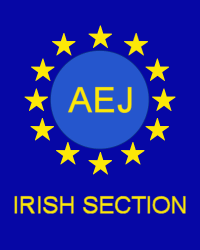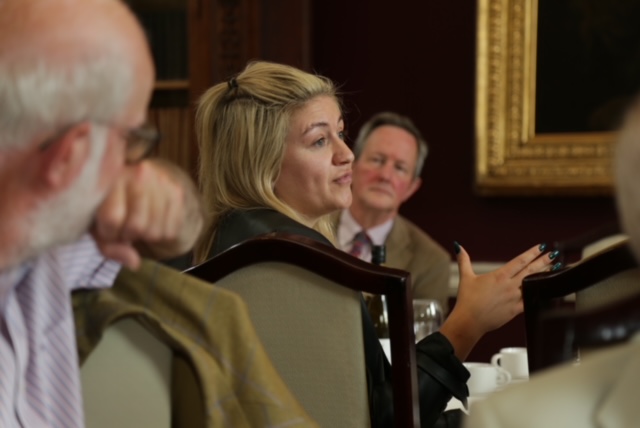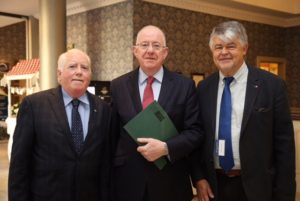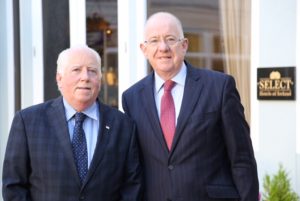Speech by AIB Chairman Richard Pym
As a British citizen, chairing an Irish bank, previously chairing a Swedish bank, with a family in America, spreading my time between three countries and paying taxes in two, I probably come close to being the global citizen described by the British Prime Minister in September as “a citizen of nowhere and knowing nothing of citizenship.”
I’ve only met Mrs May once, a long time ago, and I’m sorry if I upset her.
Coming from the Prime Minister of a country that wants to be a leader in world trade these are extraordinarily ill judged remarks.
The country that what was once one of the most open and tolerant societies in the world has taken a big step backwards.
Ireland was very keen that Britain stayed in the European Union. But is now in a unique position to benefit from Britain’s folly after a period of adjustment in the economy. Ireland is open for business, anchored in the European Union, and a very attractive location for inward investment. Even after Brexit we forecast growth of over 3% next year.
The Ambassador represents a government that basically has no policy on anything concerning Brexit. We know from the Prime Minister that “Brexit means Brexit”, which is her most helpful observation to date.
The British Government wants a period of reflection behind closed doors as it went into the referendum with scandalously no preparation for a Brexit, and is now trying to figure something out. Business is crying out for clarity. And now Parliament might have the power to challenge the executive but subject to a further court case.
Unlike Ireland the British government starts Brexit with its public finances in poor shape. A government spending deficit well outside Eurozone norms, and the latest month’s figures show a worrying shortfall in tax receipts. Accompanied by a massive trade deficit funded by external capital flows now under threat from Brexit.
As Bank of England Governor Carney is reported as saying that British policy is “testing the kindness of the strangers who fund the deficit”.
With inflation headed to 3% next year, reflecting the 20% currency devaluation against the dollar, then the central bank faces some very interesting policy choices.
Some have been surprised by the continued growth in the UK economy. I think of it like one of those Road Runner cartoons, you know where Wile E Coyote is chasing Road Runner, and continues the chase over the edge of the cliff. Momentum carries the creature forward for a time before gravity has its inevitable victory.
In the UK business investment is falling, some sectors are already contracting, but consumer spending has continued growing which has sustained the growth figures. Once consumers find their wallets constricted then the UK economy will look very different.
Tragically the old and the poor are the ones who will be hit most by the economic effects. The inflation will be disproportionately high on their spending on food, fuel, and clothing. Interest rates on savings will lag inflation, depleting capital. Wage growth will lag inflation.
But what did they vote for?
Why did so many vote for Brexit?
The campaign focussed on:
Ending freedom of movement
Maintaining continued access to the single market
That there would be no adverse economic effects from leaving, we were told “the experts are always wrong”
The ability to enter into trade agreements independent of the EU
350 million pounds a week more for the National Health Service promised on the side of the campaign bus
Sovereignty of the British Parliament and courts
And an end to European Regulations and laws
Fantastic promises and tempting to those who know little about economics or politics.
We were also told that Ukraine and Turkey were about to join the EU and the UK was their work destination of choice.
But it is all untrue. A massive lie.
But it was promised to the population by some of the best communicators in British politics, Farage, Gove, Johnson et al.
Well let’s see how much of it is delivered by Mrs. May.
This is all a reflection of this age of “post truth” politics which is developing on both sides of the Atlantic.
It is almost as if the Age of Enlightenment, le Siecle des Lumieres, the victory of reason, had not happened.
However the more thoughtful voices in British politics are now calling for a second referendum on the terms of Brexit. The electorate voted for a departure, not on the destination. They are surely allowed a vote on whether the deal eventually proposed is better than the current arrangement of staying In. They certainly won’t be getting anything close to the campaign promises.
The British government will also have a view to the 2020 election. Whilst they might deliver the Brexit mandate they will not be forgiven if the economy tanks.
I was much taken by an exhibition at a US art gallery I visited in September. It was called “When Cities Fall” — a thoughtful exhibition looking at architectural decay — and featured the description “shifting trade routes can reduce a rich and majestic place to an architectural boneyard in the historical blink of an eye”. What fate awaits the UK?
Whilst I am optimistic long term on the Republic of Ireland, I am more concerned on the economy of the north, Northern Ireland.
There the state sector is large, the private sector small, and the economy is dependent on subsidy from London.
The politics and peace process are complex, well beyond my comprehension.
With the depreciation of the British Pound there is now an incentive for the most economically active of Northern Ireland citizens to work in the Republic of Ireland and remit their Euro earnings home to the north.
Northern Ireland is still attractive for foreign firms looking for cheap labour in dollar terms but that is not exactly a cheery strategy for the population. And whether the factories will have a market to sell into is, of course, an open question.
Let me conclude,
The European nations are Britain’s best friends and allies.
We are a European people.
I still hope that once the severe economic threats become evident and effect the wallets and purses of the nation that someone will show leadership and that the British will change their mind. The Brexit campaign was led by a group of chancers and opportunists, it is now time for the real leaders to stand up.
It is a tragedy that at the time that our two nations are as close as they have ever been in their history that this has happened.
Minister, please excuse the British madness. If Britain continues with its madness then Ireland will need to deliver infrastructure and housing improvements to encourage British firms to relocate and encourage even more FDI into the country. Allied Irish Banks guarantees to support government initiatives in these areas. We have the financial strength to support the economy and with 40% of the banking system as our responsibility we stand shoulder to shoulder with you in investing in Ireland’s future.
Thank you for listening and I really look forward to a lively debate.



